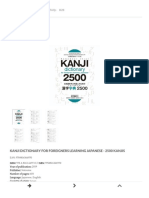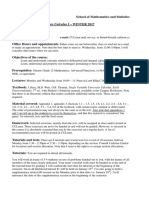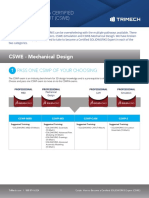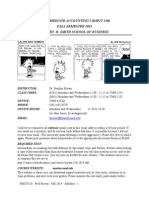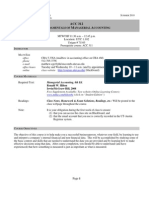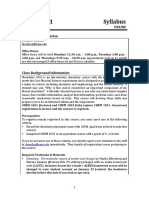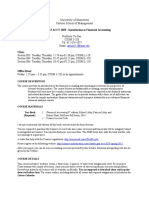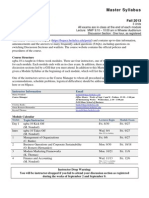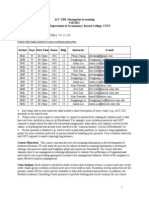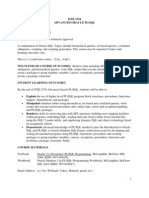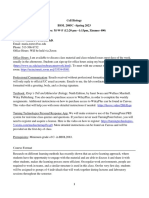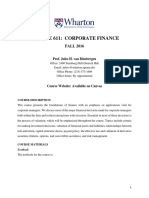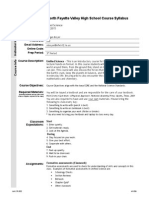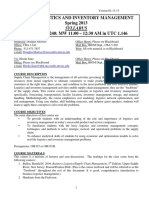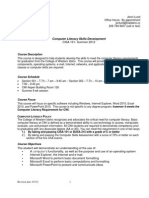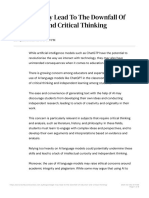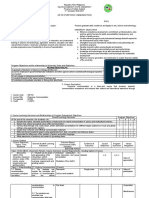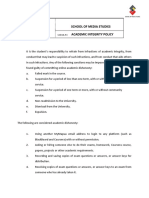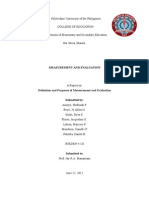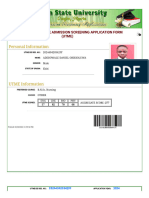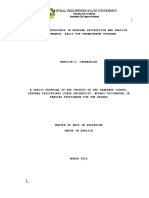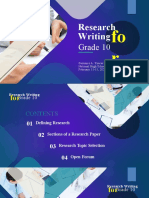ACC 312 - Fundamentals of Managerial Accounting - AtiaseF
ACC 312 - Fundamentals of Managerial Accounting - AtiaseF
Uploaded by
Gul AsfCopyright:
Available Formats
ACC 312 - Fundamentals of Managerial Accounting - AtiaseF
ACC 312 - Fundamentals of Managerial Accounting - AtiaseF
Uploaded by
Gul AsfCopyright
Available Formats
Share this document
Did you find this document useful?
Is this content inappropriate?
Copyright:
Available Formats
ACC 312 - Fundamentals of Managerial Accounting - AtiaseF
ACC 312 - Fundamentals of Managerial Accounting - AtiaseF
Uploaded by
Gul AsfCopyright:
Available Formats
Syllabus Accounting 312: Fundamentals of Managerial Accounting Spring 2009
Class Hours: TTh 9:30 11:00am (Unique #: 02295) Location: UTC 1.102
Professor: E-mail: Webpage: Phone: TA: E-mail:
Florence Atiase Florence.Atiase@mccombs.utexas.edu http://courses.utexas.edu (Blackboard) (512) 471-5329
Office: Office Hours:
CBA 2.218 TTh 12:30-1:30pm
Office: Office Hours:
Required Materials MANAGERIAL ACCOUNTING, by Ronald W. Hilton (8th edition, 2009). Electronic Supplements Homework solutions and selected Powerpoint slides for each chapter will be posted on Blackboard. Additional readings and study materials, if any, will be posted on Blackboard as well. It is your obligation, during the first week of class, to ensure: (1) that you can access the class site on Blackboard, and (2) that the email account that you use is correctly recorded in the UT-Austin Registrar system. Publisher Supplements Available A study guide to accompany MANAGERIAL ACCOUNTING ($) Text website (Online Learning Center): www.mhhe.com/hilton8e (free - click on Student Edition) This site is actually quite useful, as it includes chapter summaries and quizzes that will help you review chapter content. Course Objective The objective of this course is to help make you a successful businessperson, whatever your field, by learning to use and interpret a companys internal financial and non-financial data. This will be accomplished by studying some of the basic context and skills that are needed to understand the data you are provided and by learning how to make effective decisions using that data. Course Routine You are encouraged to ask questions in class, both to seek technical clarification of points discussed in class and to understand how a particular topic relates to your personal interest in business. To do this effectively, you will need to, and are expected to, study the chapter readings and other assigned materials and complete suggested homework problems PRIOR TO each class meeting. When we are together, we must devote time to the discussion and illustration of some of the more important applications and trickier aspects of the assigned materials and, if you have not prepared yourself with the
Spring 2009 Syllabus ACC 312 Page 1
basics, you will not be able to ask good clarifying questions, nor will you have time to absorb everything we discuss. Academic Standards Course grades will be determined using the following deliverables and weights: Two (non-cumulative) Midterms Lowest midterm Highest midterm Final Exam (cumulative) Quizzes Team Assignment 17.5% 27.5% 35% 15% 5% 100% The class average for this course has typically been in the 2.7 - 2.9 range. You may assess your performance based on the traditional grade cutoffs of 90% = A, 80% = B, 70% = C, 60% = D, and below 60% = F. There is generally no curve in this class, but I reserve the right to curve final grades, if necessary, based on the class average and the academic standards for the course. Incompletes will be given only in the rarest of circumstances and according to university policy. There will be no opportunity to raise your course grade by doing "extra credit" work either before or after the end of the semester. Examinations There will be two midterm examinations and a comprehensive (cumulative) final examination. They will be held on the dates and times indicated in the Class Schedule at the end of this Syllabus. Class will not be held on the class day closest to the exam. All students in all sections of ACC 312 will take the exam at the same time. All exams will be closed book/notes. Alternate exams: If you have another UT class or UT exam at the same time as one of the midterms, there is a provision for an alternate exam. Similarly, if you have another UT final exam that directly conflicts with our scheduled final, there is a provision for an alternate exam. However, in all cases permission to take an alternate exam is at my discretion and the request must be made in writing at least 96 hours in advance. Note that conflicts such as classes at other educational institutions (including UT Extension) and work schedules will not constitute an acceptable reason to take an alternate exam. If you miss a midterm exam due to an illness or other emergency reason, you should notify me before the exam, if possible, and provide me with written documentation (e.g., a note from the attending physician) after you return. I have final authority to determine if your absence is excused. If so, and if it is feasible for you to take the scheduled alternate exam (see prior paragraph), you may do so. Otherwise, students with an excused absence from a midterm exam will be required to add the weight of that exam (the lowest midterm weight) to the weight of the final exam. No make-up exams will be given and unexcused absences will result in an exam grade of 0.
Quizzes
There will be 6 quizzes over the course of the semester and you will be able to drop your lowest score. Quizzes will be given on the days indicated by an asterisk on Pages 5 and 6. There will be no make-up quizzes.
Spring 2009
Syllabus ACC 312
Page 2
Team Assignment Soon after the first midterm, I will randomly assign each student to a group of 3-4 students and distribute more information about the Team Assignment. The purpose of this assignment is to develop your ability to connect managerial accounting concepts to current business practices and problems and to effectively communicate financial information. Supplemental reading and research will be required for this assignment, and the deliverable will be prepared in Powerpoint. No oral presentation will be required. The deliverable will be due in class on April 16. All members of each team will normally receive the same grade on this assignment, however I reserve the right to assign partial or zero credit to anyone not carrying their weight on the team. A peer evaluation mechanism will be made available. Homework Homework is assigned for most chapters and is meant to be done outside of, and before, class. We will not use class time to cover it. Homework is intended to be a learning experience rather than a grading device. You should develop your best solution for each of the problems assigned. Working with fellow students is strongly encouraged. If you have questions about how to solve the exercises or problems after looking at the solutions, you should see the TA or professor during office hours. The homework assignments generally are not turned in, and solutions are available on Blackboard. E-mail and Blackboard The use of e-mail and blackboard is required for this course, and I will use the e-mail addresses that are supplied to me on the official UT class rosters. If you normally use a different e-mail address, please enter it in the registrar system or make sure the UT email address you have given the registrar is set up for forwarding to your preferred address. Any outside-of-class announcements that I make (e.g., corrections or clarifications of items discussed in class, syllabus changes, quiz announcements, etc.) will likely be sent to you via e-mail or posted to the class Blackboard site. It is your responsibility to regularly check both your e-mail and the class Blackboard site. Class Protocol Laptop use during class is prohibited except with permission of the instructor. Please be sure your cell phones are on silent, vibrate, or off before class begins. Do not answer calls or text during class. If for some reason you are running late, do not feel you should skip class. Please come in quietly and take a seat at the side or in the rear of the classroom. If you must leave class early, I appreciate being notified at the beginning of class, if possible. Grade Appeals If you believe a grading error has occurred and wish to appeal a grade assigned, you may do so within one week after the item is returned to the class by submitting a written explanation of your concern, attached to the graded item in question, to the professor in class or in office hours. After one week has passed, no appeals will be considered.
Spring 2009
Syllabus ACC 312
Page 3
Important Disclosures Electronic Class Rosters
Web-based, password-protected class sites are available for all accredited courses taught at The University. Syllabi, handouts, assignments and other resources are types of information that may be available within these sites. Site activities could include exchanging e-mail, engaging in class discussions and chats, and exchanging files. In addition, class e-mail rosters will be a component of the sites. Students who do not want their names included in these electronic class rosters must restrict their directory information in the Office of the Registrar, Main Building, Room 1. For information on restricting directory information see Section 9. Educational Records in the General Information catalog available from the Registrar at http://registrar.utexas.edu/catalogs/.
Students with Disabilities
The University of Texas at Austin provides, upon request, appropriate academic accommodations for qualified students with disabilities. Services for Students with Disabilities (SSD) is an area of the Office of the Dean of Students and is located in Room 4.104 of the Student Services Building. You can call SSD at 471-6259 (voice) or 232-2937 (VP) for additional information.
Policy on Scholastic Dishonesty
The McCombs School of Business and the Department of Accounting have no tolerance for acts of scholastic dishonesty. The responsibilities of both students and faculty with regard to scholastic dishonesty are discussed in The Code of Conduct for the McCombs School of Business, which can be found at www.mccombs.utexas.edu/udean/advising/policy/code_of_conduct.asp. It is your responsibility, and in your best interest, to read and understand it. By teaching this course, I have agreed to observe all faculty responsibilities described in that document. By enrolling in this class, you agree to observe all student responsibilities described in that document. If the application of that Policy Statement to this class and its assignments is unclear in any way, it is your responsibility to ask me for clarification. Students who violate University rules on scholastic dishonesty are subject to disciplinary penalties, including the possibility of failure in the course and/or dismissal from the University. Since dishonesty harms the individual, all students, and the integrity of the University, policies on scholastic dishonesty will be strictly enforced. Scholastic dishonesty includes, but is not limited to: copying tests or assignments, representing (copying) the work of another person as one's own or allowing another person to represent your work as their own, collaborating without authority with another student during an exam or in preparing academic work, using or having on your desk unauthorized materials or aids to complete a quiz or exam (e.g., unauthorized cheat sheets, solutions, and electronic storage devices such as graphing or programmable calculators, cell phones, music players, etc), continuing work on an exam after a stop time has been announced, etc. You should refer to the Student Judicial Services website at: http://deanofstudents.utexas.edu/sjs/ or the General Information catalog to access the official University policies and procedures on scholastic dishonesty as well as further elaboration on what constitutes scholastic dishonesty.
Spring 2009
Syllabus ACC 312
Page 4
ACC 312 Class Schedule Florence Atiase
(Omit appendices except where indicated) Date
Week 1 Tues, Jan 20 Thurs, Jan 22 Week 2 Tues, Jan 27 Thurs, Jan 29 Week 3 Tues, Feb 3 Thurs, Feb 5* Week 4 Tues, Feb 10 Thurs, Feb12 Week 5 Tues, Feb 17* Thurs, Feb 19 Week 6 Tues, Feb 24 Thurs, Feb 26 Week 7 Tues, Mar 3 Thurs, Mar 5 Week 8 Tues, Mar 10* Thurs, Mar 12
No.
1 2 3 4 5 6 7 8 9 10 11 12 13 14 15 16 Cost Behavior Cost Estimation
Topic
Introduction to Managerial Accounting Costs of Production Cost Management Concepts Product Costing Design Job Costing Applications Process Costing Design Process Costing Applications Activity-Based Costing Design Activity-Based Costing Applications Activity-Based Management and Customer Profitability Analysis Ch. 1
Text
Suggested Problems
Ch. 2 (pp. 36-50) Ch. 2 (pp. 50-62) Ch. 3 (pp. 80-91) Ch. 3 (pp. 91-110) Ch. 4 (pp. 134-144, through end of Step 2) Ch. 4 (pp. 144-153) Ch. 5 (pp. 168-177) Ch. 5 (pp. 178-186) Ch. 5 (pp. 186-199)
25, 28, 44 24, 30, 34, 46 23, 24, 28, 31, 37 33, 36, 45 15, 17, 18, 20 22, 27, 28, 30 26, 27, 54 30, 31, 33, 59 63, 66, 67
MIDTERM #1 7-10 p.m., Room TBA (seats assigned in advance) Ch. 6 (pp. 232-244) 22, 23, 26, 35 Ch. 6 (pp. 244-253) Ch. 7 (pp. 274-285 + Appendix) Ch. 7 (pp. 285-302) 24, 33 (use Excel for regression), 44 23, 24, 25, 33 30, 31, 35, 41
Calculating Break-even CVP Analysis No Class
Spring 2009
Syllabus ACC 312
Page 5
Tues, Mar 17 Thurs, Mar 19 Week 9 Tues, Mar 24 Thurs, Mar 26* Week 10 Tues, Mar 31 Thurs, Apr 2 Week 11 Tues, Apr 7* Thurs, Apr 9 Week 12 Tues, Apr 14 Thurs, Apr 16 Week 13 Tues, Apr 21 Thurs, Apr 23 Week 14 Tues, Apr 28 Thurs, Apr 30* Week 15 Tues, May 5 Thurs, May 7 Final Exam Thurs, May 14 tentative 17 18 19 20 21 22 23 24 25 26 27 28 29 30 Responsibility Centers Investment Center Measurement and Balanced Scorecard Transfer Pricing Relevant Costs and Special Decisions Joint Products and Limited Resources Pricing and Target costing Wrap-up Master Budgets Other Budgeting Issues Standard Costs and Variance Analysis Variance Analysis, contd. Flexible Budgeting Overhead Variances
No Class Spring Break Ch. 9 (pp. 346-369) Ch. 9 (pp. 369-377) Ch. 10 (pp. 402-413) Ch. 10 (pp. 414-425, 432) Ch. 11 (pp. 456-465 + Appendix B) Ch. 11 (pp. 465-477) 22, 24, 25, 35 28, 37, 39, 43 28, 29, 30, 35, 51 36, 47, 52 30, 32, 34, 38 25, 26, 42
MIDTERM #2 7-10 p.m., Rooms TBA (seats assigned in advance) Ch. 12 (pp. 500-514) Ch. 13 (pp. 542-559) + Ch. 10 (pp. 425-431) Ch. 13 (pp. 559-570) Ch. 14 (pp. 586-603) Ch. 14 (pp. 603-614) Ch. 15 (pp. 638-665) 27, 28, 42 Ch 13: 24, 25, 26, 31 Ch10: 58 34, 35, 48 31, 32, 34, 36, 39, 40, 48 37, 38, 41, 46 29, 30, 31, 33, 34, 42
The FINAL EXAM will NOT be held on the dates listed in the course schedule. We have requested a common final exam for all sections of ACC 312 on Thursday, May 14, from 7-10 p.m. But this date is TENTATIVE: the university will not confirm the time and place of the exam until later in the semester. If you need to make travel reservations before we receive a date commitment, please do not make them before Sunday, May 17. If the university forces the exam to be held on a date the following week, I will work with you to reschedule your exam as long as you have followed this guideline.
Spring 2009
Syllabus ACC 312
Page 6
You might also like
- Digital SAT Preview: What to Expect + Tips and StrategiesFrom EverandDigital SAT Preview: What to Expect + Tips and StrategiesRating: 5 out of 5 stars5/5 (4)
- Kanji Dictionary For Foreigners Learning Japanese - 2500 Kanjis - ISBN - 9784816366970 PDFDocument4 pagesKanji Dictionary For Foreigners Learning Japanese - 2500 Kanjis - ISBN - 9784816366970 PDFdivyanayak16% (38)
- Answers 1220618085860270 8Document11 pagesAnswers 1220618085860270 8monalishas_171% (7)
- PHYS1008 W2013 Course OutlineDocument7 pagesPHYS1008 W2013 Course Outlinetomandfred12No ratings yet
- Syl - ME 335Document4 pagesSyl - ME 335ellie<3No ratings yet
- Econ 306 SyllabusDocument6 pagesEcon 306 SyllabusVen DezelNo ratings yet
- Math 1007gDocument3 pagesMath 1007gAmna BaigNo ratings yet
- CSWE - Mechanical Design: How To Become A Certified Solidworks Expert (Cswe)Document4 pagesCSWE - Mechanical Design: How To Become A Certified Solidworks Expert (Cswe)1234vishal mimaniNo ratings yet
- ACC 312 - Fundamentals of Managerial Accounting MW 330 - BrownDocument8 pagesACC 312 - Fundamentals of Managerial Accounting MW 330 - BrownKrizzy KanhaNo ratings yet
- Financial Statements SyllabusFall2016Document6 pagesFinancial Statements SyllabusFall2016MD PrasetyoNo ratings yet
- OM 335 (04180) Operations Management Spring 2013: MW 8:00 AM - 9:30 AM in GSB 5.142ADocument6 pagesOM 335 (04180) Operations Management Spring 2013: MW 8:00 AM - 9:30 AM in GSB 5.142Akpankaj88No ratings yet
- Fall 3050 SyllabusDocument6 pagesFall 3050 Syllabustaher91No ratings yet
- 2011 SyllabusDocument4 pages2011 SyllabusbobstrongNo ratings yet
- Econ 100c Syllabus Ssi13Document7 pagesEcon 100c Syllabus Ssi13other1991No ratings yet
- Syllabus From A Human Computer Interaction Class at UGADocument6 pagesSyllabus From A Human Computer Interaction Class at UGAPaul PraeNo ratings yet
- Stat260 OutlineA0102 Jan2020Document6 pagesStat260 OutlineA0102 Jan2020UtghiiNo ratings yet
- Intermediate Microeconomics SyllabusDocument6 pagesIntermediate Microeconomics SyllabusAlbert RofiNo ratings yet
- Name: Office: Telephone: E-Mail:: Following Caption For The Subject Line: .)Document11 pagesName: Office: Telephone: E-Mail:: Following Caption For The Subject Line: .)Ray LaiNo ratings yet
- BMGT 310 SB Syllabus - Fall 2014Document9 pagesBMGT 310 SB Syllabus - Fall 2014HasnainJamalNo ratings yet
- ACC 312 - Fundamentals of Managerial Accounting - EgeDocument6 pagesACC 312 - Fundamentals of Managerial Accounting - EgeShin JozenNo ratings yet
- 2013CACCT101001Document6 pages2013CACCT101001Miranda Art Archit KerrNo ratings yet
- ACC240 MW Fall 2017Document9 pagesACC240 MW Fall 2017Albi MathewNo ratings yet
- CHEM 1061-002 - Syllabus - Salmon - Spring2021-1Document17 pagesCHEM 1061-002 - Syllabus - Salmon - Spring2021-1Aziz AlbadiNo ratings yet
- FIN 370 201 Fall 2016 Syllabi - LUDocument5 pagesFIN 370 201 Fall 2016 Syllabi - LUdrhugh3891No ratings yet
- ACCT 5131 Online SP 2019 SyllabusDocument9 pagesACCT 5131 Online SP 2019 SyllabusaustinNo ratings yet
- ACCT3350-002 - 202180 - David ReppenhagenDocument8 pagesACCT3350-002 - 202180 - David ReppenhagenfeiselNo ratings yet
- MAC 1105 SyllabusDocument7 pagesMAC 1105 SyllabusBrandon E. PaulNo ratings yet
- CLAS 230-All J Sections - Fall 2021 - SyllabusDocument14 pagesCLAS 230-All J Sections - Fall 2021 - SyllabusMorgan GalushaNo ratings yet
- Business Law 301 Legal Foundations of The Canadian Economy Winter 2014Document8 pagesBusiness Law 301 Legal Foundations of The Canadian Economy Winter 2014Jim WilsonNo ratings yet
- Econjn 0060 SYLlPrinFall 17 MWDocument6 pagesEconjn 0060 SYLlPrinFall 17 MWLauren SerafiniNo ratings yet
- 2050spring15 SyllabusDocument7 pages2050spring15 SyllabusJimNo ratings yet
- Syllabus - WPC 301Document5 pagesSyllabus - WPC 301lkjdflksdjfNo ratings yet
- PPPA CUJ Masters SyllabusDocument13 pagesPPPA CUJ Masters SyllabusRodrigo Uribe BravoNo ratings yet
- UGBA 10 Master SyllabusDocument6 pagesUGBA 10 Master Syllabusjacky8hyfNo ratings yet
- UT Dallas Syllabus For Ba3360.5e1.11f Taught by Monica Brussolo (Meb049000)Document6 pagesUT Dallas Syllabus For Ba3360.5e1.11f Taught by Monica Brussolo (Meb049000)UT Dallas Provost's Technology GroupNo ratings yet
- ACC 2203 SyllabusDocument4 pagesACC 2203 SyllabusJustin HuynhNo ratings yet
- Acct. 203 SyllabusDocument6 pagesAcct. 203 SyllabuslinkatcalNo ratings yet
- ITSE 2354 Advanced Oracle PL/SQLDocument9 pagesITSE 2354 Advanced Oracle PL/SQLJanet Palmer Ward ΦθκNo ratings yet
- IDS270 Syl Spring 2024 CRN45430Document3 pagesIDS270 Syl Spring 2024 CRN45430leahshelton381No ratings yet
- MATH1020U - Syllabus Winter 2013 PDFDocument6 pagesMATH1020U - Syllabus Winter 2013 PDFsunnyopgNo ratings yet
- Syllabus - Fall 2015 295 MondayDocument7 pagesSyllabus - Fall 2015 295 MondayzzmasterNo ratings yet
- Syllabus BIOL2085C Spring 2023Document8 pagesSyllabus BIOL2085C Spring 2023Tara BhatnagarNo ratings yet
- CHEM116 Syllabus_Fall_2024 Friday sections 013Document11 pagesCHEM116 Syllabus_Fall_2024 Friday sections 013crice1No ratings yet
- Acc 380K.7 - Financial Statement Analysis - Seybert PDFDocument5 pagesAcc 380K.7 - Financial Statement Analysis - Seybert PDFceojiNo ratings yet
- FINA 365 Fall 2016 SyllabusDocument6 pagesFINA 365 Fall 2016 SyllabusKent NguyenNo ratings yet
- Finance 611: Corporate Finance: FALL 2016Document13 pagesFinance 611: Corporate Finance: FALL 2016RexNguyenNo ratings yet
- Sta 2023 Syllabus - Spring 2015 - 10483Document6 pagesSta 2023 Syllabus - Spring 2015 - 10483dskNo ratings yet
- 14-15 SyllabusDocument4 pages14-15 Syllabusapi-252900678No ratings yet
- Om 368: Logistics and Inventory Management Spring 2013 Unique No. 04240: MW 11:00 - 12:30 AM in UTC 1.146Document7 pagesOm 368: Logistics and Inventory Management Spring 2013 Unique No. 04240: MW 11:00 - 12:30 AM in UTC 1.146berkNo ratings yet
- ECON 3104: Microeconomic Theory: TH THDocument4 pagesECON 3104: Microeconomic Theory: TH THwssanbornNo ratings yet
- Cisa 101 Summer SyllabusDocument5 pagesCisa 101 Summer SyllabusJenni Davis LundNo ratings yet
- Cool WipesDocument7 pagesCool WipesGodwin RichmondNo ratings yet
- Syllabus MGT AcctgDocument9 pagesSyllabus MGT AcctgofrecioAMNo ratings yet
- EC 101 AA SyllabusDocument5 pagesEC 101 AA SyllabusJane Olivia YangNo ratings yet
- ACG3401 - Business Processes and Accounting Information Systems - 04AE - Pundrich, GDocument7 pagesACG3401 - Business Processes and Accounting Information Systems - 04AE - Pundrich, Gmasondonovan033No ratings yet
- Shahbazi Biol 1110 Syllabus - Fall12Document6 pagesShahbazi Biol 1110 Syllabus - Fall12Tyler KohNo ratings yet
- BAN602Syllabus_FA_2024(1)Document7 pagesBAN602Syllabus_FA_2024(1)laura.zenga13No ratings yet
- Syllabus Spring2015 FIN818Document6 pagesSyllabus Spring2015 FIN818nguyen_tridung2No ratings yet
- ACT Prep Book 2019 Edition: ACT Study Guide with Practice Tests for the English, Math, Reading, Science, and Writing Sections of the ACT ExamFrom EverandACT Prep Book 2019 Edition: ACT Study Guide with Practice Tests for the English, Math, Reading, Science, and Writing Sections of the ACT ExamRating: 5 out of 5 stars5/5 (28)
- Master the New York City Specialized High School Admissions TestFrom EverandMaster the New York City Specialized High School Admissions TestNo ratings yet
- ChatGPT May Lead To The Downfall of Education and Critical Thinking - Tech BusinDocument8 pagesChatGPT May Lead To The Downfall of Education and Critical Thinking - Tech Businyikaw81271No ratings yet
- Sultan Kudarat State UniversityDocument10 pagesSultan Kudarat State UniversitySnyrah AmbagNo ratings yet
- Summer Semester Notification 2023Document3 pagesSummer Semester Notification 2023ThoughtsNo ratings yet
- SSP 006 M&MDocument2 pagesSSP 006 M&Mrior.insisto.swuNo ratings yet
- 4 Cad10l Academic Integrity AgreementDocument2 pages4 Cad10l Academic Integrity AgreementRussel John PunoNo ratings yet
- Application No: RegularDocument2 pagesApplication No: RegularBussiness EmpireNo ratings yet
- Zetech Research MethodologyDocument85 pagesZetech Research MethodologykalasingayvonneNo ratings yet
- QEAPP Q2 - Module 5 Writing A Report - V4Document65 pagesQEAPP Q2 - Module 5 Writing A Report - V4bernadette domoloan100% (1)
- Obe Syllabus Sy 2023 2024 Malabon HistoryDocument6 pagesObe Syllabus Sy 2023 2024 Malabon Historyemjhay rasgoNo ratings yet
- Math Major's Thesis (Reviewed)Document57 pagesMath Major's Thesis (Reviewed)George Kevin TomasNo ratings yet
- hall ticketDocument1 pagehall ticketRutuja pawarNo ratings yet
- Affiliation CriteriaDocument11 pagesAffiliation CriteriaMuhammad AzeemNo ratings yet
- 311 Week 4 Formative Assessment (Part 1)Document7 pages311 Week 4 Formative Assessment (Part 1)Rellan YbanezNo ratings yet
- Definition and Purposes of Measurement and EvaluationDocument7 pagesDefinition and Purposes of Measurement and EvaluationJac Flores50% (6)
- Aqar 2018-19Document65 pagesAqar 2018-19Rakesh Kumar DNo ratings yet
- 2024 Undergraduate Admissions Screening Application FormsDocument2 pages2024 Undergraduate Admissions Screening Application Formsdanielokikioluwa37No ratings yet
- Faq IytDocument10 pagesFaq IytIndana ZulfaNo ratings yet
- CSAB-2022 Special Rounds: Information BrochureDocument33 pagesCSAB-2022 Special Rounds: Information BrochureRahul RoushanNo ratings yet
- Admit Card 2019-20 Odd-SemDocument2 pagesAdmit Card 2019-20 Odd-SemAàrúShhNo ratings yet
- Applicant ViewDocument5 pagesApplicant ViewAshish JoeshiNo ratings yet
- SSC CGLDocument3 pagesSSC CGLAřJűn DashNo ratings yet
- UCEED2024 Information BrochureDocument67 pagesUCEED2024 Information BrochureamaansudemyNo ratings yet
- Chapter 1 3 G1 12eDocument18 pagesChapter 1 3 G1 12erobertodevera188No ratings yet
- Manilyn Compliance Manuscript 2Document49 pagesManilyn Compliance Manuscript 2Russel SuperficialNo ratings yet
- Afi11 202v1Document33 pagesAfi11 202v1Azer AzerNo ratings yet
- Gen PeriyarDocument147 pagesGen PeriyarLibrary M.SelvamNo ratings yet
- IMRAD PresentationDocument76 pagesIMRAD PresentationLeo Jaranilla GutierrezNo ratings yet
- APD-ATO-500 Authorized Training Organization (ATO) Program Document Rev 00 - FINALDocument30 pagesAPD-ATO-500 Authorized Training Organization (ATO) Program Document Rev 00 - FINALAzhar GulzarNo ratings yet

